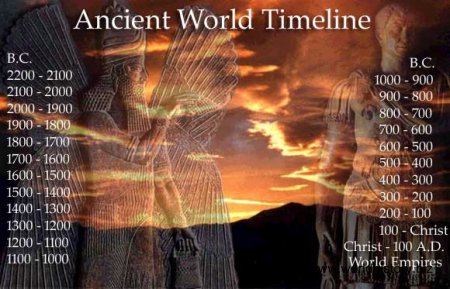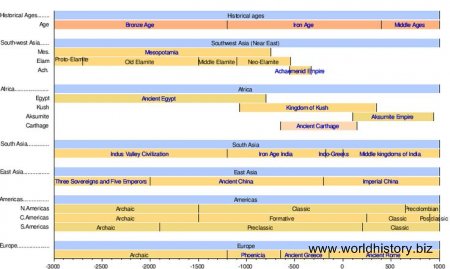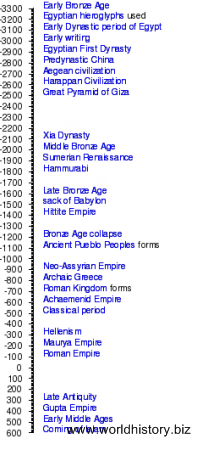Ancient Egypt. Timeline
Ancient India. Timeline
Ancient China. Timeline
Ancient Aztecs. Timeline
Ancient Maya. Timeline
Ancient Greece. Timeline
Ancient Rome. Timeline

Ps 33:8-9 "Let all the earth fear the LORD; Let all the inhabitants of the world stand in awe of Him, For He spoke, and it was done; He commanded, and it stood fast"
Bible Chronology. Regarding the chronology of the Old Testament it is important to know that most of the dates cannot be determined with any sort of accuracy. For all of the dates concerning the life of Abraham and the patriarchs there is no accurate chronology from the standpoint of archaeology. This timeline of the ancient world follows the Biblical dating of Ussher's chronology which dates the creation of the world in 4004 BC. If this were true then the flood would've happened in 2348 BC and Abraham would've been born in 1996 BC. Moses would've been born in 1571 BC and the Hebrews would've escaped Egypt in 1491 BC and entered the land of Canaan in 1451 BC. Bible verses are given along with the date as well. Also see Timeline of the Pentateuch
Ancient Chronology. The major events that happened in the great civilizations of the ancient world are traced from various academic sources and dates become more certain as we approach the birth of Christ.
The Biblical Perspective on History. The Bible reveals a beginning and an end of world history. It reveals the truth about God's original intention for mankind and how sin entered the world. The Bible also reveals what will happen at the very end of time. The best explanation of man's events in world history is probably best understood by taking a close look at the Temptation of Jesus Christ by Satan mentioned in Luke 4: Satan offered to Jesus all the kingdoms of the world if Jesus would only bow down and worship him. Jesus responded, "It is written, you shall worship the Lord your God and him only shall you serve." According to the Bible Satan fell or was cast out of heaven because he wanted to be worshipped like God, and throughout history and even now his purpose remains the same, he deceives mankind into following his way of thinking, and ultimately rebel against heaven, and by doing so they unknowlingly serve (worship) him. Satan's ultimate goal is to overthrow God and at the end of time he will get his chance, but he will lose according to the Scriptures. But what does Satan's fall have to do with world history? World history is best studied in the context of world empires, or one kingdom or another attempting to expand their boundaries and ultimately dominate the world. But where did this desire come from? The Bible reveals that Satan is the "ruler of this world" (John 12:31) and "the Prince of the power of the air" (Ephesians 2:2), and he is a spiritual being that cannot be seen with the five senses. Satan has been working throughout history, yet the Bible reveals that God has also been working fashioning every century of history with an ultimate goal in mind, that at the "fulness of time" (Galatians 4:4) He would send a Savior who would conquer the world through love, and anyone who would follow Him could be part of eternity with God, the creator of man. And to be clear on God's purpose He chose to come Himself, and to show His love by dying as a substitue, and cut the covenant with His own blood. World history is going to end after the final rebellion of Satan to overthrow God's kingdom, but God Himself defeats him and creates a new heaven and a new earth. The followers of Jesus are referred to as His bride, and they will be clothed with a new body created for eternity, and they will dwell in the new heaven and the new earth forever. Most will follow Satan in the rebellion (Matthew 7:14). There is no way to fully understand every detail but the message is clearly revealed in the Bible. This ancient history timeline reveals some main events that happened throughout world history from the creation of the world until the destruction of the Temple in 70 A.D. with a biblical perspective.
Link: www.bible-history.com


Bronze Age and Early Iron Age
The Bronze Age refers to a period in human cultural development when the most advanced metalworking (at least in systematic and widespread use) included techniques for smelting copper and tin from naturally-occurring outcroppings of copper ores, and then smelting those ores to cast bronze. These naturally-occurring ores typically included arsenic as a common impurity. Copper/tin ores are rare, as reflected in the fact that there were no tin bronzes in western Asia before 3000 BC. In some parts of the world, a Copper Age follows the Neolithic and precedes the Bronze Age.
The Iron Age was the stage in the development of any people in which tools and weapons whose main ingredient was iron were prominent. The adoption of this material coincided with other changes in some past societies often including differing agricultural practices, religious beliefs and artistic styles, although this was not always the case.
- c. 3500 BC: Egyptian calendar
- 3300 BC: Bronze Age begins in the Near East[1]
- 3300 BC: Newgrange Ireland
- 3300 BC: Hakra Phase of the Indus Valley Civilization begins in the Indian Sub-continent.
- 3300-3000 BC: Saflieni phase in Maltese prehistory
- 3200 BC: Cycladic civilization in Greece
- 3200 BC: Norte Chico civilization begins in Peru
- 3200 BC: Rise of Proto-Elamite Civilization in Iran
- 3100 BC: Skara Brae Scotland
- 3100 BC: First dynasty of Egypt
- c. 3000 BC: Sumerian cuneiform writing system.[2]
- c. 3000 BC: Stonehenge construction begins. In its first version, it consisted of a circular ditch and bank, with 56 wooden posts.[3]
- c. 3000 BC: Cucuteni-Trypillian culture in Romania and the Ukraine
- 3000 BC: Jiroft civilization begins in Iran
- 3000 BC: First known use of papyrus by Egyptians
- 2800 BC: Kot Diji phase of the Indus Valley Civilization begins
- 2800 BC: Three Sovereigns and Five Emperors period in China
- 2700 BC: Minoan Civilization ancient palace city Knossos reach 80,000 inhabitants
- 2700 BC: Rise of Elam in Iran
- 2700 BC: The Old Kingdom begins in Egypt
- 2600 BC: Oldest known surviving literature: Sumerian texts from Abu Salabikh, including the Instructions of Shuruppak and the Kesh temple hymn.
- 2600 BC: Mature Harappan phase of the Indus Valley civilization (in present-day Pakistan and India) begins
- 2600 BC: Emergence of Maya culture in the Yucatán Peninsula
- 2560 BC: King Khufu completes the Great Pyramid of Giza.
- 2500 BC: The mammoth goes extinct.
- 2200 -2100 BC: 4.2 kiloyear event: a severe aridification phase, likely connected to a Bond event, which was registered throughout most North Africa, Middle East and continental North America. Related droughts very likely caused the collapse of the Old Kingdom in Egypt and of the Akkadian Empire in Mesopotamia.
- 2200 BC: completion of Stonehenge.
- 2070 BC: Yu the Great established the Xia Dynasty in China
- 2000 BC: Domestication of the horse
- 1800 BC: alphabetic writing emerges
- 1700 BC: Indus Valley Civilization comes to an end but is continued by the Cemetery H culture; The beginning of Poverty Point Civilization in North America
- 1600 BC: Minoan civilization on Crete is destroyed by the Minoan eruption of Santorini island.
- 1600 BC: Mycenaean Greece
- 1600 BC: The beginning of Shang Dynasty in China, evidence of a fully developed Chinese writing system
- 1600 BC: Beginning of Hittite dominance of the Eastern Merranean region
- 1500 BC: Composition of the Rigveda is completed
- 1400-400 BC: Olmec civilization flourishes in Pre-Columbian Mexico, during Mesoamerica's Formative period
- 1200 BC: The Hallstatt culture
- 1200-1150 BC: Bronze Age collapse in Southwestern Asia and in the Eastern Merranean region. This period is also the setting of the Iliad and the Odyssey epic poems (which were composed about four centuries later).
- c. 1180 BC: Disintegration of Hittite Empire
- 1100 BC: Use of Iron spreads.
- 1046 BC: The Zhou force (led by King Wu of Zhou) overthrow the last king of Shang Dynasty; Zhou Dynasty established in China
- 1020 to 930 BC: The beginning of the Kingdom of Israel (united monarchy) occurred sometime between these dates
- 890 BC: Approximate date for the composition of the Iliad and the Odyssey
- 800 BC: Rise of Greek city-states
Classical Antiquity
Classical antiquity is a broad term for a long period of cultural history centered on the Merranean Sea, comprising the interlocking civilizations of Ancient Greece and Ancient Rome. It refers to the timeframe of Ancient Greece and Ancient Rome.[4][5] Ancient history includes the recorded Greek history beginning in about 776 BC (First Olympiad). This coincides roughly with the traditional date of the founding of Rome in 753 BC and the beginning of the history of Rome.[6][7]
- 776 BC: First recorded Olympic Games.
- 753 BC: Founding of Rome (traditional date)
- 745 BC: Tiglath-Pileser III becomes the new king of Assyria. With time he conquers neighboring countries and turns Assyria into an empire.
- 728 BC: Rise of the Median Empire.
- 722 BC: Spring and Autumn Period begins in China; Zhou Dynasty's power is diminishing; the era of the Hundred Schools of Thought.
- 700 BC: the construction of Marib Dam in Arabia Felix.
- 660 BC: purported date of the accession of Jimmu, the mythical first Emperor of Japan.
- 653 BC: Rise of Persian Empire.
- 612 BC: An alliance between the Babylonians, Medes, and Scythians succeeds in destroying Nineveh and causing subsequent fall of the Assyrian empire.
- 600 BC: Sixteen Maha Janapadas ("Great Realms" or "Great Kingdoms") emerge in India.
- 600 BC: Evidence of writing system appear in Oaxaca used by the Zapotec civilization.
- c. 600 BC: Pandyan kingdom in South India.
- 586 BC: Destruction of the First Temple in Jerusalem (Solomon's Temple) by the Babylonians.
- 563 BC: Siddhartha Gautama (Buddha), founder of Buddhism is born as a prince of the Shakya tribe, which ruled parts of Magadha, one of the Maha Janapadas.
- 551 BC: Confucius, founder of Confucianism, is born.
- 550 BC: Foundation of the Persian Empire by Cyrus the Great.
- 549 BC: Mahavira, founder of Jainism is born.
- 546 BC: Cyrus the Great overthrows Croesus King of Lydia.
- 544 BC: Rise of Magadha as the dominant power under Bimbisara.
- 539 BC: The Fall of the Babylonian Empire and liberation of the Jews by Cyrus the Great.
- 529 BC: Death of Cyrus
- 525 BC: Cambyses II of Persia conquers Egypt.
- c. 512 BC: Darius I (Darius the Great) of Persia, subjugates eastern Thrace, Macedonia submits voluntarily, and annexes Libya, Persian Empire at largest extent.
- 509 BC: Expulsion of the last King of Rome, founding of Roman Republic (traditional date).
- 508 BC: Democracy instituted at Athens
- c. 500 BC: completion of Euclid's Elements
- 500 BC: Panini standardizes the grammar and morphology of Sanskrit in the text Ashtadhyayi. Panini's standardized Sanskrit is known as Classical Sanskrit
- 500 BC: Pingala uses zero and binary numeral system
- 499 BC: King Aristagoras of Miletus incites all of Hellenic Asia Minor to rebel against the Persian Empire, beginning the Greco-Persian Wars.
- 490 BC: Greek city-states defeat Persian invasion at Battle of Marathon
- 483 BC: Death of Gautama Buddha
- 480 BC: Persian invasion of Greece by Xerxes; Battles of Thermopylae and Salamis
- 479 BC: Death of Confucius
- 475 BC: Warring States period begins in China as the Zhou king became a mere figurehead; China is annexed by regional warlords
- 470/469 BC: Birth of Socrates
- 465 BC: Murder of Xerxes
- 458 BC: The Oresteia by Aeschylus, the only surviving trilogy of ancient Greek plays, is performed.
- 449 BC: The Greco-Persian Wars end.
- 447 BC: Building of the Parthenon at Athens started
- 432 BC: Construction of the Parthenon is completed
- 431 BC: Beginning of the Peloponnesian war between the Greek city-states
- 429 BC: Sophocles's play Oedipus the King is first performed
- 427 BC: Birth of Plato
- 424 BC: Nanda dynasty comes to power.
- 404 BC: End of the Peloponnesian War
- 400 BC: Zapotec culture flourishes around city of Monte Albán
- 399 BC: Death of Socrates
- 384 BC: Birth of Aristotle
- 331 BC: Alexander the Great defeats Darius III of Persia in the Battle of Gaugamela, completing his conquest of Persia.
- 326 BC: Alexander the Great defeats Indian king Porus in the Battle of the Hydaspes River.
- 323 BC: Death of Alexander the Great at Babylon.
- 321 BC: Chandragupta Maurya overthrows the Nanda Dynasty of Magadha.
- 305 BC: Chandragupta Maurya seizes the satrapies of Paropanisadai (Kabul), Aria (Herat), Arachosia (Qanadahar) and Gedrosia (Baluchistan)from Seleucus I Nicator, the Macedonian satrap of Babylonia, in return for 500 elephants.
- 300 BC: Construction of the world's largest pyramid, the Great Pyramid of Cholula, begins in Cholula, Puebla, Mexico.
- 273 BC: Ashoka the Great becomes the emperor of the Mauryan Empire
- 257 BC: Thục Dynasty takes over Việt Nam (then Kingdom of Âu Lạc)
- 250 BC: Rise of Parthia (Ashkâniân), the second native dynasty of ancient Persia
- 232 BC: Death of Emperor Ashoka the Great; Decline of the Mauryan Empire
- 230 BC: Emergence of Satavahanas in South India
- 221 BC: Qin Shi Huang unifies China, end of Warring States period; marking the beginning of Imperial rule in China which lasts until 1912. Construction of the Great Wall by the Qin Dynasty begins.
- 207 BC: Kingdom of Nan Yueh extends from North Việt Nam to Canton.
- 206 BC: Han Dynasty established in China, after the death of Qin Shi Huang; China in this period officially becomes a Confucian state and opens trading connections with the West, i.e. the Silk Road.
- 202 BC: Scipio Africanus defeats Hannibal at Battle of Zama.
- 200 BC: El Mirador, largest early Maya city, flourishes.
- c. 200 BC: Chera dynasty in South India.
- 185 BC: Sunga Empire founded.
- 149-146 BC: Third Punic War between Rome and Carthage. War ends with the complete destruction of Carthage, allowing Rome to conquer modern day Tunisia and Libya.
- 146 BC: Roman conquest of Greece, see Roman Greece
- 129 BC: Roman conquest of Turkey.
- 121 BC: Roman armies enter Gaul for the first time.
- 111 BC: First Chinese domination of Việt Nam in the form of the Nanyue Kingdom.
- c. 100 BC: Chola dynasty rises in prominence.
- 80 BC: The city of Florence is founded.
- 49 BC: Roman Civil War between Julius Caesar and Pompey the Great.
- 44 BC: Julius Caesar murdered by Marcus Brutus and others; End of Roman Republic; beginning of Roman Empire.
- 40 BC: Roman conquest of Egypt.
- 18 BC: Three Kingdoms period begins in Korea.
- 6 BC: Earliest theorized date for birth of Jesus of Nazareth.
- 4 BC: Widely accepted date (Ussher) for birth of Jesus Christ.
- 9: Battle of the Teutoburg Forest, the Imperial Roman Army's bloodiest defeat.
- 14: Death of Emperor Augustus (Octavian), ascension of his son Tiberius to the throne.
- 24: The temple of Jerusalem is reconstructed.
- 26-34: Crucifixion of Jesus Christ, exact date unknown.
- 37: Death of Emperor Tiberius, ascension of his nephew Caligula to the throne.
- 40: Rome conquers Morocco.
- 41: Emperor Caligula is assassinated by the Roman senate. His uncle Claudius succeeds him.
- 43: Rome enters Britain for the first time.
- 54: Emperor Claudius dies and is succeeded by his grand nephew Nero.
- 68: Emperor Nero commits suicide, prompting the Year of the four emperors in Rome.
- 70: Destruction of Jerusalem by the armies of Titus.
- 79: Destruction of Pompeii by the volcano Vesuvius.
- 98: After a two-year rule, Emperor Nerva dies of natural causes, his adopted son Trajan succeeds him.
- 106-117: Roman Empire at largest extent under Emperor Trajan after having conquered modern-day Romania, Iraq and Armenia.
- 117: Trajan dies of natural causes. His adopted son Hadrian succeeds him. Hadrian pulls out of Iraq and Armenia.
- 126: Hadrian completes the Pantheon in Rome.
- 138: Hadrian dies of natural causes. His adopted son Antoninus Pius succeeds him.
- 161: Death of Antoninus Pius. His rule was the only one in which Rome did not fight in a war.
- 192: Kingdom of Champa in Central Việt Nam.
- 200s: The Buddhist Srivijaya Empire established in Maritime Southeast Asia.
- 220: Three Kingdoms period begins in China after the fall of Han Dynasty.
- 226: Fall of the Parthian Empire and Rise of the Sassanian Empire.
- 238: Defeat of Gordian III (238–244), Philip the Arab (244–249), and Valerian (253–260), by Shapur I of Persia, (Valerian was captured by the Persians).
- 280: Emperor Wu established Jin Dynasty providing a temporary unity of China after the devastating Three Kingdoms period.
- 285: Diocletian becomes emperor of Rome and splits the Roman Empire into Eastern and Western Empires.
- 285: Diocletian begins a large-scale persecution of Christians.
- 292: The capital of the Roman empire is officially moved from Rome to Mediolanum (modern day Milan).
- 301: Diocletian's edict on prices
- 313: Edict of Milan declared that the Roman Empire would tolerate all forms of religious worship.
- 325: Constantine I organizes the First Council of Nicaea.
- 330: Constantinople is officially named and becomes the capital of the eastern Roman Empire.
- 335: Samudragupta becomes the emperor of the Gupta empire.
- 337: Emperor Constantine I dies, leaving his sons Constantius II, Constans I, and Constantine II as the emperors of the Roman empire.
- 350: Constantius II is left sole emperor with the death of his two brothers.
- 354: Birth of Augustine of Hippo
- 361: Constantius II dies, his cousin Julian succeeds him.
- 378: Battle of Adrianople, Roman army is defeated by the Germanic tribes.
- 380: Roman Emperor Theodosius I declares the Arian faith of Christianity heretical.
- 395: Theodosius I outlaws all religions other than Catholic Christianity.
- 406: Romans are expelled from Britain.
- 407-409: Visigoths and other Germanic tribes cross into Roman-Gaul for the first time.
- 410: Visigoths sacks Rome for the first time since 390 BC.
- 415: Germanic tribes enter Spain.
- 429: Vandals enter North Africa from Spain for the first time
- 439: Vandals have conquered the land stretching from Morocco to Tunisia by this time.
- 455: Vandals sack Rome, capture Sicily and Sardinia.
- c. 455: Skandagupta repels an Indo-Hephthalite attack on India.
- 476: Romulus Augustus, last Western Roman Emperor is forced to abdicate by Odoacer, a chieftain of the Germanic Heruli; Odoacer returns the imperial regalia to Eastern Roman Emperor Zeno in Constantinople in return for the title of dux of Italy; most frequently cited date for the end of ancient history.
End of ancient history in Europe
The date used as the end of the ancient era is arbitrary. The transition period from Classical Antiquity to the Early Middle Ages is known as Late Antiquity. Late Antiquity is a periodization used by historians to describe the transitional centuries from Classical Antiquity to the Middle Ages, in both mainland Europe and the Merranean world: generally from the end of the Roman Empire's Crisis of the Third Century (c. AD 284) to the Islamic conquests and the re-organization of the Byzantine Empire under Heraclius. The Early Middle Ages are a period in the history of Europe following the fall of the Western Roman Empire spanning roughly five centuries from AD 500 to 1000. Not all historians agree on the ending dates of ancient history, which frequently falls somewhere in the 5th, 6th, or 7th century. Western scholars usually date the end of ancient history with the fall of Rome in AD 476, the death of the emperor Justinian I in AD 565, or the coming of Islam in AD 632 as the end of ancient European history.




 World History
World History









